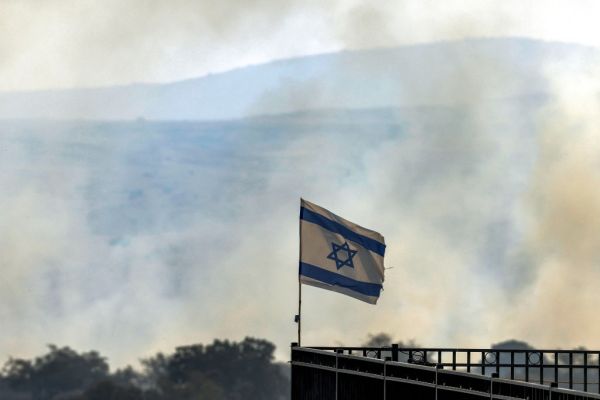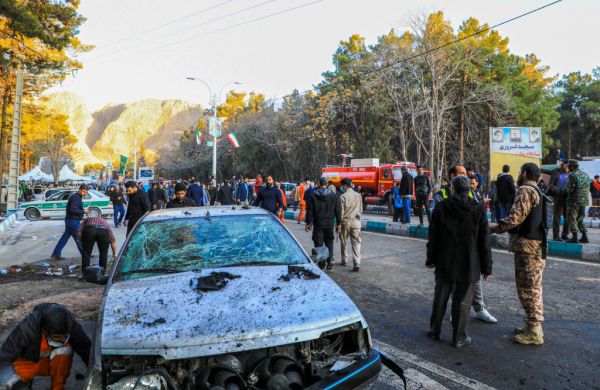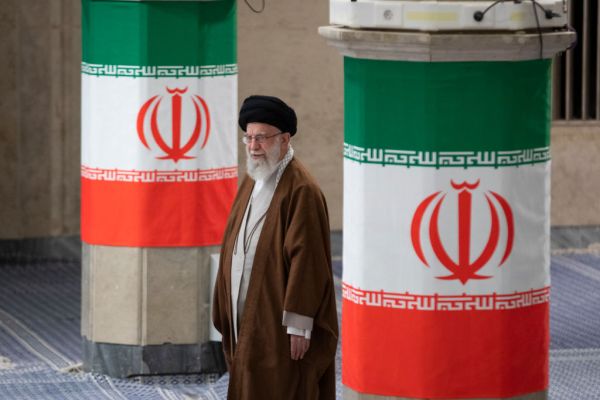Last week, Director of National Intelligence Avril Haines released a statement highlighting Iran’s role in stoking anti-Israel protests in the United States: “We have observed actors tied to Iran’s government posing as activists online, seeking to encourage protests, and even providing financial support to protesters.” While stressing that individuals are expressing their true opinions on the horrifying loss of life in Gaza, she warned that “Iran is becoming increasingly aggressive in their foreign influence efforts, seeking to stoke discord and undermine confidence in our democratic institutions.” Haines’ statement put the world on notice that campus protests are not entirely organic.
The usual suspects, such as the Hamas-linked Council on American Islamic Relations (CAIR), complained that Haines’ statement lacks specificity. “Our government must not deliberately or accidentally resurrect (Joe McCarthy’s or J. Edgar Hoover’s) legacy by weaponizing its power to smear or silence the American people,” said Edward Ahmed Mitchell, CAIR’s national deputy director. “To address these concerns, we encourage you to share much more clarifying detail about the Iranian operation.”
Such criticism misses the mark. Haines’ warning that Iran is encouraging and even funding campus protests is new information, but that Iranian influence operations exist in the U.S. is old news. Indeed, it would be far more surprising if Iran were not involved in egging on recent protests.
The clearest example of this kind of influence is that several high-ranking former Iranian government officials have held, and in some cases continue to hold, positions at major U.S. universities. Indeed, two years ago, The Dispatch reported on Seyed Hossein Mousavian, a former high-level Iranian diplomat, nuclear negotiator, and regime propagandist who nonetheless serves as a “Middle East security and nuclear policy specialist,” at Princeton University, where he’s been since 2009. But this flew under the radar until last year. In 2023, Mousavian became the focal point of two congressional investigations, one, by the House and Senate Armed Service Committees which focused on a speech he gave to STRATCOM, and by the House Education and Workforce Committee, which focused on the wider issue of his closeness to the Iranian regime.
More recently, documents reviewed by investigative reporter Jay Solomon showed that, while at Princeton, Mousavian worked closely with former Iranian Foreign Minister Javad Zarif to promote Iran’s messaging and engagement with the West.
Mousavian is not alone. Until recently, another former high-ranking Iranian diplomat, Mohammad Jafar Mahallati, was a professor at Oberlin College in Ohio, following a stint at Columbia University. Amnesty International has alleged that Mahallati was deeply involved in the cover-up of a regime-sponsored massacre in 1988 during his time as Iran’s ambassador to the United Nations. More recently, Mahallati openly bragged about his usefulness to the Iranian regime in a letter he undoubtedly thought would not get noticed in the U.S. But it was noticed, prompting a congressional investigation. During this same period, Oberlin was facing a Department of Education civil rights investigation for antisemitism based, in part, on the allegation that Mahallati had openly taught students support for Hamas and terrorism.
While Mahallati remains, technically, employed by Oberlin, he is on indefinite suspension. That suspension, however, was only after that Oberlin learned he’d run a sex-for-grades operation while at Columbia. If that isn’t weird enough, consider this: The Iranian Mission to the United Nations attempted to shield Mahallati from this lawsuit by secretly appointing him to another diplomatic position and thus granting him diplomatic immunity, showing that the regime continued to consider Mahallati an asset.
Iran’s influence is not limited to a few professors who once held positions in the Iranian regime. Iran also allegedly controls the Alavi Foundation, which is clearly influential on U.S. universities.
Alavi openly brags about its influence on U.S. universities on their website, which lists donations to at least 15, including Princeton, Harvard, and Columbia. These donations, while ostensibly “made in support of Shia studies, Iranian studies and the teaching of Persian language,” their real purpose seems to have another agenda. For just one example, Mohammad Jafari Mahallati’s brother, Mohammad Hossein Mahallati, previously served as the Alavi Foundation’s director, and Alavi made a significant donation to Columbia right after Mohammad Jafari Mahallati got his appointment. The Trump administration’s Department of Education opened investigations into Alavi’s influence on universities.
Alavi’s influence is not limited to universities. It also sponsors numerous Shiite mosques in America. At least two Alavi-supported mosques, one in Potomac, Maryland, and one in Houston, have featured children singing propagandistic songs to Iranian regime officials in videos and pictures it distributes online. Working to control Shiite clergy is a common tactic for the Iranian regime and is not limited to America. Iran’s Imam Khomeini Memorial Trust serves a very similar function in India, for example. Other organizations serve similar functions across Europe.
Founded in 1973 under the previous government, Alavi quickly fell under the influence of the mullahs after the 1979 revolution. According to the Department of Justice, the Iranian ambassador to the United Nations took direct control of Alavi in 1991. One attorney with the Manhattan district attorney’s Office was direct: “We found evidence that the government of Iran really controlled everything about the foundation.” Back in 2009, then-U.S. Attorney Preet Bharara filed suit against the Alavi Foundation seeking to seize its U.S. assets. While litigation remains in limbo, a Manhattan jury found that Alavi had violated Iran sanctions law and ordered a forfeiture of assets worth hundreds of millions of dollars.
Another organization that influences U.S. universities is the American Institute of Iranian Studies (AIIrS). Like the Alavi Foundation, it was founded before the Islamic Revolution in 1979, and it sought, innocuously, to “represent American institutions of higher education and research in the field of Iranian Studies.” But it too has since been co-opted by the Iranian regime. AIIrS now works directly with the Sa’adi Foundation, an Iranian institution run by a former Iranian parliamentary speaker and close adviser to Ayatollah Ali Khamenei. One Iranian expat, an expert in regime influence operations, describes Sa’adi as “part of an extensive government-led network that advances the Islamic Republic’s revolutionary, ideological and political agenda in the region and across the world.” Nonetheless, AIIrS still receives federal funds even while working with the highest echelons of the Iranian regime to propagandize American students.
The list of clear and suspected Iranian fronts seeking to influence politics, academics, and religious institutions in the U.S. is almost endless:
A wealthy Iranian American family, members of which have been convicted of illegally transporting more than $100 million in violation of U.S. sanctions on Iran, openly funds multiple universities in California, as well as various far-left and far-right political organizations.
A former head of “political ideology,” for Iran’s navy, who sympathizes with Iranian-backed designated terrorist organizations, openly runs a major mosque in Michigan.
There are think tanks such as the Quincy Institute, founded by Trita Parsi, a Iranian/Swedish national with documented ties to the Iranian regime and a long history of forming pro-regime pressure groups. It’s supported by those with connections to fringe parts of the right and the hard left, including groups like the Rockefeller Foundation and Ploughshares Fund, both of which have also funded Mousavian’s work. In the past, Quincy has had trouble gaining influence outside the solid left of the Democratic party, promoting events with left-leaning senators like Chris Murphy of Connecticut, but that's started to change. Trump’s vice presidential nominee, Sen. J.D. Vance, spoke there this past May.
The so-called “Iran Experts Initiative,” which has earned the attention of Congress, saw Iranian foreign ministry officials directly influencing academics and those at top think tanks across the West. One of those, Ariane Tabatabai, now works at the Pentagon and maintains a security clearance. Others, such as Dina Esfandiary and Ali Vaez, worked directly with former Iran envoy Rob Malley. Malley, of course, was sidelined due to alleged mishandling of classified material, and is now teaching at Princeton and Yale.
Until Iran-backed Hamas’ October 7 massacre, the Biden administration sought to downplay Iranian misdeeds to the greatest extent possible, in the vain hope of reentering into something resembling the deeply flawed “Iran deal.” Even after October 7, the Biden administration has been slow to punish even kinetic Iranian aggression. It is thus reasonable to assume that Haines’ statement means the intelligence of Iran’s influence is overwhelming and undeniable. Far more scrutiny of the wider issue of Iranian influence is needed.
Nobody can feel good about the deaths of innocents occurring in Gaza, and undoubtedly many Americans believe they are doing the right thing in protesting Israel’s actions. But ultimately the finger should be pointed at Iran and its proxies, including Hamas. Iran’s influence operations have every incentive to tear America apart politically and to downplay its own involvement in the October 7 massacre. America and its allies should rid itself of this pernicious network.






Please note that we at The Dispatch hold ourselves, our work, and our commenters to a higher standard than other places on the internet. We welcome comments that foster genuine debate or discussion—including comments critical of us or our work—but responses that include ad hominem attacks on fellow Dispatch members or are intended to stoke fear and anger may be moderated.
With your membership, you only have the ability to comment on The Morning Dispatch articles. Consider upgrading to join the conversation everywhere.